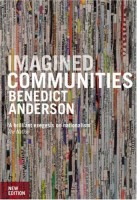Random
Geography Thursday! Yippie!
I’ve only been in Geography for four weeks, and I have to admit, I haven’t “learned” a whole lot from classes. I have read a bunch of cool Geography stuff on my own. So rather than vent my frustration about class, I’ll talk about a book.
Benedict Anderson’s Imagined Communities posits that the social/community aspect of citizenship is premised on an imagined solidarity between people based on the arbitrary boundaries of the nation-state.
Let me back up for just one brief digression/explanation: In 1950, T.H. Marshall revolutionized the concept of citizenship by breaking it down to three categories: civil rights, political rights, and social rights. What was so ground-breaking about Marshall’s claim is the addition of social rights into the mix, which ties in notions of solidarity and community. Prior to Marshall, citizenship as a concept focused strictly on the relationship between citizen and nation-state. Marshall acknowledged the power in nationalism, pride, etc.
In order for there to be nationalism–and perhaps more importantly, in order for there to be people willing to die for their nation–there must be a solidarity between citizens (or else: a draft. My comment, not his.), but the key point is that this solidarity is imagined. The kinship felt is imagined, or at least, in its most nascent form, it was imagined. Anderson uses the United States as an example. It is impossible for us to know all 310 million people living in the States, and yet we are expected to feel solidarity as a nation-state.
 In class last week, I explained the concept of imagined communities. Anderson is a big name in Geography, one I only recently learned but I’m new; nonetheless, several students in the class were really reluctant to “buy into” his ideas. One woman (who I happen to find very problematic) argued that when a category 4 hurricane (named Igor) hit Newfoundland, Canadians banded together in a non-imagined way to help. She was diligent in arguing her point, even though she was wrong, very wrong. See: Canadians may’ve banded together, but it was because they imagined a solidarity, a commonality, when in reality, there isn’t one. A nation is just a chunk of land. A state is just the mechanism that governs it.
In class last week, I explained the concept of imagined communities. Anderson is a big name in Geography, one I only recently learned but I’m new; nonetheless, several students in the class were really reluctant to “buy into” his ideas. One woman (who I happen to find very problematic) argued that when a category 4 hurricane (named Igor) hit Newfoundland, Canadians banded together in a non-imagined way to help. She was diligent in arguing her point, even though she was wrong, very wrong. See: Canadians may’ve banded together, but it was because they imagined a solidarity, a commonality, when in reality, there isn’t one. A nation is just a chunk of land. A state is just the mechanism that governs it.
What does this have to do with writing?
Well, I would argue that HTML Giant is more of a real community, even though it is not manifest in one location, than most real–geographic–communities. The bond that we share here, writing and reading, is more of a solidarity than what I would feel with any average American walking down the street, even if that street was in Canada or some other country. The bond we share here is probably greater than the one I would share with any average Asian American walking down the street, even though we share the same visual markers and possibly shared experience growing up. And yet, HTML Giant is also an imagined community because it isn’t real, it isn’t material, and the solidarity is based on superficialities.
Nonetheless, I think there’s something fascinating about locating a community through a social network and seeing exactly how this community can be simultaneously material, virtual, and imagined. What do you think?
Tags: imagined communities


I like this Geography Thursday feature(s).
Is the US a nation-state?
I like this Geography Thursday feature(s).
Is the US a nation-state?
The sole reason I’m happy for Geography Thursdays is I’ll have a weekly excuse to get inside Lily Hoang’s brain. Great post!
I also think this will be an interesting experiment, although I’m interested the subject, so I might be biased.
we’re weirdos. i support your posit, this comment-nebula being called community. it’s hard to be a weirdo out there in the fresh air. the comraderie here is quite intentional. in electronic cadres of even rarer esoterisms (my personal speckle: the fountain pen network), it becomes even more apparent. a person can only take so much solitude when they are filled with peculiar passions.
Good post, Lily! I read Imagined Communities a few years ago, while studying 18th century lit, back when I was obsessed with Franco Moretti’s whole mapping thing.
Speaking of which, you might totally be interested in checking out Moretti’s work, if you haven’t already, because it’s very much predicated on the intersection of literature and geography; I’d recommend Atlas of The European Novel as a good entry point, then Maps, Graphs, Trees.
Who wants to do a ‘community reading group’? I’d love to tackle 3 major texts on community (all of which i’ve been meaning to read forever):
coming community- agamben
unavowable community- blanchot
inoperative community- nancy
serious, i’d love to read these with some people because, you know, they’re about community. plus they are famously difficult texts and it’d be nice to have some interpretive teamwork.
That sounds sort of interesting. How/where would the discussion happen? I would add Jacques Camatte to that list as supplemental reading (re: ‘the community of capital’).
Hi Chris: Yes, I need to read more Moretti. He’s on my list! I’ll let you know as I get there…
Oh I am ALL about this. Anyone interested in a “community” reading group, shoot me an email at: Lily.Hoang.326[at]gmail[dot]com, and I will set us up with a Google group or something like that. What do you think?
Are you taking any quantitative stuff yet: spherical trig, stochastics, geodetics, etc? Have you mapped with ArcGIS much?